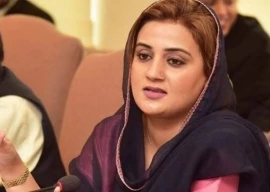
Strong networking between women in rural areas can be the best option to overcome domestic violence.
“It is because a woman can understand the problem of other woman very well. Therefore, by sharing each other’s misery, they can support each other well,” said Uks Director Tasneem Ahmer at the launching of Uks Research Centre’s 2012 desk diary titled “Women of Pakistan: Saying NO to Domestic Violence”.
She added that radio too can play a significant role in creating awareness among rural people and can provide a platform for victims to speak their hearts out.
The diary looks at domestic violence through the eyes of the media, and especially the extent to which editors, columnists, reporters, photographers and cartoonists have acknowledged and taken up domestic violence as a major social disease.
Ahmar expressed her concern over the lack of space given to news on the prevention of domestic violence in the media and said, “Even though domestic violence is a very serious issue affecting society as a whole, the amount of news coverage on how to prevent it is abysmally low. News of domestic violence is only highlighted when an incident occurs and there are often no follow-ups, which kills the case.”
Quoting an example, she said that recent bills passed on women protection were not covered as well as they could have been. “No hype was generated, no debate moderated; they were only reported on,” she said.
Later, radio programmes produced by Uks on domestic violence were played. The programmes contained interviews with victims of domestic violence across the country.
They said that when a girl is married, she is told that her, life and death are in her in-laws’ hands.
She has to compromise in all situations. They shared the types of physical and psychological violence they were subjected to, and in some cases still face, from male family members.
One of the programmes was based on an interview with psychiatrist Dr Ambreen Ahmed. She said that both physical and psychological violence on women leaves a negative impact on their wellbeing.
She loses all her confidence and falls in to an inferiority complex, hopelessness, depression and anxiety.
About rape, she said that the act kills the victim psychologically and gives them the feeling that they have lost their identity, dignity and dreams. Survival in the society for them becomes tough because people treat them like pariahs instead of victims of crime. Unfortunately, a number of them lose the will to live and opt for suicide while others fall victim to mental illnesses.
Published in The Express Tribune, December 17th, 2011.





1732701958-0/BeFunk_§_]__-(61)1732701958-0.jpg)
1732705114-0/Untitled-design-(7)1732705114-0-270x192.webp)
1732084432-0/Untitled-design-(63)1732084432-0-270x192.webp)


1732705646-0/BeFunk_§_]__-(62)1732705646-0.jpg)






COMMENTS
Comments are moderated and generally will be posted if they are on-topic and not abusive.
For more information, please see our Comments FAQ